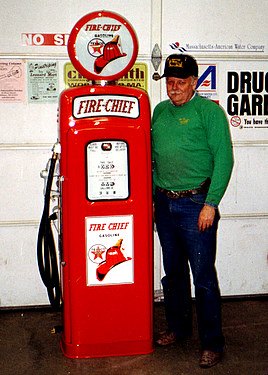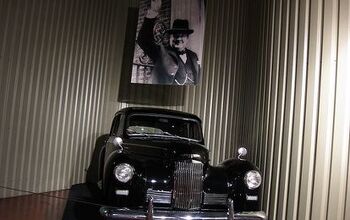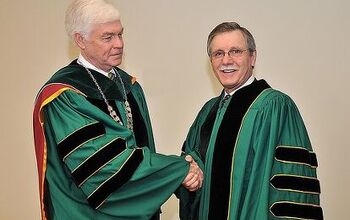Quote of the Day: It's Good to Be King Edition
I know it’s a bit early in the day for a quote of the day, but I have to go test drive a XXXXXX for the TTAC Ten Worst Awards. Hopefully, Eddy will wake up from his birthday celebrations soon, equipped with enough functional brain cells to continue to feed the beast (that’s you) with fresh autoinfotainment. So before I leave my garret to drive a POS on your behalf, I’d like to leave you with this thought: “the Tesla is really just another example of why gasoline is still king.” These words of wisdom come to us via Ralph Kinney Bennett, who pens paen to petrol for The American. “A gallon of gas weighs about 6.3 pounds and produces roughly 35 kilowatt hours of energy. That’s enough to burn a 100-watt light bulb continuously for more than two weeks. A lead-acid battery could do the same thing without needing a recharge—if it were the size of a desk and weighed a ton. Energy density is the point. We just haven’t come up with a fuel or a device that will safely and economically offer the same calorific value in such a small space as an automobile’s gasoline tank.” OK, lithium ion batteries. OK, range. Specifically, a 911 vs. a Tesla Roadster…
“But, while the Tesla’s batteries are electronically panting and cooling off and its dash displays are flashing warnings about decreased range and automatically restricting the electric motor’s torque, the Porsche will go merrily on its way and cruise up to 400 miles on the remaining gasoline in its 17.7 gallon tank. And while the Tesla is recharging its batteries over a period of hours, the Porsche can have its tank refilled in a minute or two and be on its way.”
More by Robert Farago


































Comments
Join the conversation
Transport is really difficult when the oil runs out or becomes more difficult, or indeed you believe your trip to the shops means one less igloo for Polar Bears. Most of our technology is plug-in - i.e. we just need to make sure power comes out of the plug. Everything else, including water supply etc., depends on it. For transportation though the key issue is convenience vs waste. I can drive until the land runs out (further with ferries) in my current car because I can refuel whenever I need. People drive from London to Peking regularly in cars dating from 1920, so it's kind of a standard thing. I stop, fill it, and continue with the same range and performance. My car is reasonably efficient but no internal combustion car is "very good". Leccy tech (batteries) at the moment requires a recharge time - somewhere between 2 and 24 hours as I understand it. Ok so you can regenerate on braking, but then again my normal car slows on when I lift off, and it cuts of the fuel too. But each time the battery car stops I have to wait for it to be useful again. For commuting this is not an issue, but I don't just commute - sometimes I go to work and may be expected to undertake a 400 mile round trip at short notice. Which is why public transport is no use. And the battery car becomes impractical. Hydrogen offers a mid-ground. I can refuel when I need but there are energy losses between the generation of the power and me using it. The generation can be "green" or "nuclear" or it can mean less homes for polar bears/penguins, but the loss remains - there is less energy out of Hydrogen than takes to make it. Make the energy out of renewables and that becomes a better balance. Biofuel - where is my food ? And is the EROEI really all that good when you take into account mechanised food production and fertilizers ? I have read studies which say yes, and others which say no. Otherwise its just petrol/diesel all over again - i.e. convenient. So where is the answer ? Maybe if we could get to a point of real green energy production then Hydrogen becomes the answer. I wonder though, what the sudden increase in Hydrogen "extraction" subsequent burning/reintroduction to the atmosphere will be blamed/responsible for. In essence nothing we do will be an answer for the "green lobby" we now have. Only a return to living from the land in small communities without the facilities we have now (and that includes education, medicine and other "nice to haves") will make them happy. I can see a future where the things we petrol-heads deem important become less so. Performance - well 100 mph may become supercar territory - get used to 75 as good. 0-60 ? Well why not go for a decent 13 seconds - remember everyone else will be at the same level so trying to beat that V8 truck/repmobile at your side is unlikely to be a priority. Then of course people will offer to "hop up" your green-mobile. But we will accept this as being the "norm" - maybe.
Yeah, as was alluded to above... Energy density is not the whole point. Energy efficiency is at least as important. Consider that capacity of Tesla Roadster battery pack is about 55 kWh. That the energy equivalent to only about 1.5 gallons of gasoline. Yet John Carmack (not an environmentalist) says he gets a range of 150 miles per charge with aggressive daily driving. http://www.armadilloaerospace.com/n.x/Armadillo/Home/News?news_id=364 (scroll to the last section near the bottom of the page) How far could you drive with only 1.5 gallons of gas in your tank?